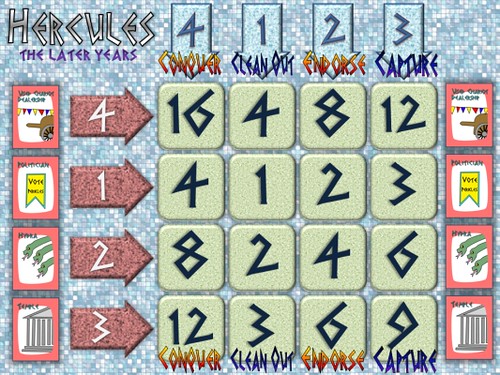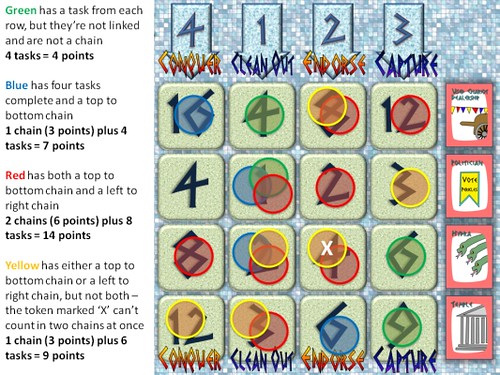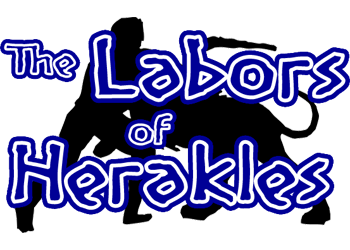October 2010 Game Design Showdown - "Herculean Task"
Please Read: Details on entering the Game Design Showdown.
This month's challenge is to design a stereotypical Eurogame about the 12 trials of Hercules.
And the winner is...
The winner of the October/November GDS, "Herculean Task," is Verb The Adjective Noun, by Isaiah Tanenbaum (ilta)!
Second place was The Labors of Herakles by Richard James (rcjames14), beating out Hercules: The Later Years by Dave (dobnarr) by just 2 votes.
Congratulations to all 4 entries, they all really look superb!
Main Design Requirements:
Theme Restriction: As the title implies, the theme of this month's challenge is Hercules and his 12 trials.
Mechanics Restriction: Many eurogames have been referred to as rehashes of a particular mechanism. There are many games that feature Auctions for example, and there's some question as to whether there's really much difference between them. But I am a firm believer that a game experience is more than just the sum of it's parts. I think that combining common mechanisms can definitely produce a fresh game experience. So this month I challenge you to combine at least 3 of the following stereotypical eurogame mechanisms to create a game about the 12 trials of Hercules:
Auctions (Amun-Re, Princes of Florence, Vegas Showdown, Evo, Age of Steam)
- Role Selection (Puerto Rico, San Juan, Glory to Rome, Twilight Emperium 3rd edition)
- Worker Placement (Caylus, Agricola, Carson City)
- Area Control (El Grande, Louis XIV, Carcasonne, Mykerinos)
- Pickup/Deliver (Railroad Tycoon, Hansa, Terra Prime)
- Variable Phase Order (Citadels, Wallenstein, Vasco Da Gama, Imperial)
- Set Collection (Coloretto, Stone Age, Ticket to Ride)
- Tile placement (Carcasonne, Tigris & Euphrates, Samurai, Acquire)
- Stock Holding (Chicago Express, Arkadia, Imperial)
- Submissions: Tuesday, 26-October-2010 through Tuesday, 2-November-2010.
- Voting: Through Friday, 12-November-2010.
- Voting Format: Each person has 6 votes to distribute any way they choose among the GDS entries with the following restrictions:
-
- You may not assign any votes to your own entry!
-
- You may not assign more than 3 votes to any single entry.
- You need not assign all 6 votes.
Comments or Questions: Comments and questions about this Challenge were handled on the Comments Thread.
- CRITIQUES: After voting has closed the entries will be posted for comments and critiques. Post constructive critiques and commentary about the entries to this Challenge in the Critiques Thread
- GDS Details: For more details on how these Game Design Showdown Challenges work, especially the details around the word count and graphics limits, visit the GDS Wiki Page.
Enjoy!
-Seth











Verb the Adjective Noun
A euro-style card game for 3-6 players
Capture the Erymanthian Boar! Clean the Augean stables! Slay the Stymphalian Birds! These are but three of the trials set before the great hero Hercules. But what of the rejected trials – the tasks left on the Olympian cutting room floor? Hercules might have been forced to “Spelunk with the Etruscan Toad,” or “Flummox the Bedazzled Gamehen!” Or perhaps you can do better?
Objective
Players are Greek gods, setting Trials before Hercules, who, being Hercules, will successfully complete exactly twelve before Zeus steps in and calls an end to the proceedings. At that point, whichever god garnered the most Laurels is declared the winner!
Components
Set-up
Gameplay
Notes: Steps 1 and 2 only happen when applicable, AND ALWAYS BEFORE the action phase. When you are out of cards in the draw deck, shuffle the discards to form a new draw deck. After the current player’s action, play passes to the left.
1. Resolve Auctions
If, at the start of your turn, you have the greatest number of markers on a Challenge card in the auction pile, you win the card but lose the markers. Return other players’ (losing) bids; remove yours from the game. Replace the card with one from the deck.
2. Resolve Completed Trials
Trials are “complete” if they have one Verb, one Adjective, and one Noun (note that a Trial may also have a Condition, but the Verb, Adjective, and Noun are still necessary for it to be complete).
If a Trial is complete at the start of your turn, AND you have the most markers on it (or are tied for first), do the following:
- Score ALL the laurels in the trial (tied players BOTH get full value), advancing your marker on the laurel track
- Return markers to their players
- Placed the trial out of play but in sight; no cards may affect it further
Trials are considered “open” until they are scored at the start of the scoring player’s turn.
3. Action
Choose one of the following actions:
3a: Bid
Place 1 - 3 markers on a single Challenge card in the auction pile.
3b: Draw
Draw a Challenge card from the face-down deck. Discard a card from your hand (it can be the card you just drew) OR remove 2 of your markers from the game.
3c: Add
Add a Challenge card to an open Trial, or start a new one. Note the following rules:
- A Trial consists of up to one Verb, Adjective, and Noun
- You may only add an “adjacent” card to an existing Trial (ie no Verb/Noun-only trials)
- The Verb, Adjective, and Noun cards must have matching edges
- Verbs have black on the left and a color on the right; Adjectives have colors on both sides; Nouns have a color on the right and black on the left
- A Trial may also have a single Condition attached. Conditions are always black, always match, and are considered “adjacent” to any existing Challenge card in a Trial
- There can only be as many open Trials as there are players
When you play a Challenge card, place a marker of your color on that card. If it’s a Condition card, follow its rule text.
Note: if you have no markers, you can’t add a Challenge card!
3d: Burn
Discard one or more Challenge cards from your hand. For each Laurel value shown, recover a “removed” marker (minimum 1 marker per card). Useful if you’re running low on markers late in the game.
Game End / Winner
As soon as the 12th Trial is completed and scored, the game ends. Whoever has the most Laurels at this point is the winner, and the gods hold an ambrosia bacchanalia in their honor.
(Euro mechanics: Auction, Set Collection, Worker [marker] Placement, Tile [card edge] placement)